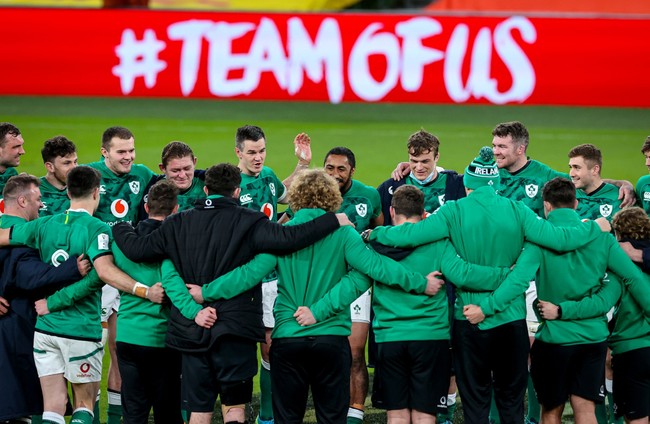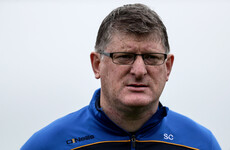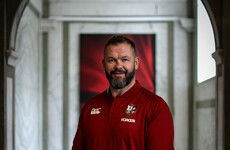THERE’S ALWAYS A moment. In every game, in every team, there’s always some incident that ignites or represents what the side stands for. You could say that came early on Saturday, Keith Earls’ try, a set-piece move, honed on the training field, transferred to the big arena, players executing the coach’s plan.
That score was like a vaccine injection to Ireland, all the fears, doubts and defeats of 2020 wiped away in an instant. Yet we’re not going to talk about the obvious thing, instead opting for something completely different. For some of you, it may already have slipped your mind. For others, it was the symbol of defiance and self-belief, the sight of the smallest member of Ireland’s pack, Josh van der Flier, thieving possession from the biggest guy on the England team, Billy Vunipola.
It came in the final quarter, shortly after Bundee Aki’s dismissal, Ireland fighting desperately to hold onto their substantial lead, Vunipola – all 19 stone of him – losing his grip on the ball, England their grip on this game.
You may have read a biblical story about this kind of contest once but the difference on Saturday was that no one was courteous enough to offer van der Flier the use of a sling.
Instead, he noted his opponent’s hesitancy, and seized his chance, cheekily picking the bigger man’s pocket, the kind of incident Charles Dickens would have worked into Oliver Twist.
“Throughout the week, we talked about how we have had that physicality and desire to put hits in but at times we have been a bit sloppy, where we didn’t use our heads,” said van der Flier of the steal. “We’re pleased that we were switched on mentally for what they were going to bring to us but also that we had a physical edge. You need the balance.”
Balance, it is the one thing Ireland have lacked since 2018. In Joe Schmidt’s final year, they played robotically, slavishly adhering to a demanding coach’s instructions, each ‘Test’ match feeling like an exam, players fearful of the repercussions if they messed things up. It was learning by rote, creativity stifled.
Then came the big change, Schmidt out, Farrell in. A new coach meant new policies and everyone kept talking about ‘heads up rugby’ and ‘smiling faces’ at training. There weren’t as many smiling on the field, though, when England, France, England again, Wales and France, defeated Ireland.
Under Schmidt the complaint was they were being fed too much detail; under Farrell it seemed as if they were not being given enough of it. But Saturday was different, the concentration in defence during England’s initial onslaught as critical to the victory as the potency in attack when Earls and Jack Conan got a sniff of the tryline.
“One thing we have learned a lot from when we played them in the autumn was that they put incredible pressure on our ball carriers which was why one of our focus points for Saturday was to keep the ball moving, because we knew that would make it a bit more difficult for them to put their hits in,” said van der Flier. “That plan worked quite well.”
As did so many other things, the scrum, the attacking line out, the set-piece move for Earls’ try, the fast flowing, phase-building play that led to the Conan score. “They are a few of the things we have been working on all throughout the Six Nations but you probably don’t get to see all of them until it all clicks like it did on Saturday.”
If we’re being honest, we didn’t see it coming. Yet we should have. Even when Ireland were comprehensively beaten by England and France last year, they had dominant patches in those games, as they did in the first half of their matches against Wales and France this year.
What was different about Saturday was that they pieced everything together, holding England to just three points during their best spell in the first quarter – ‘we kind of said to one another, don’t do anything silly, don’t show indiscipline, don’t let it become a two score game’.
Surviving a siege was only one part of the plan, being ruthless and exploiting their opportunities a bigger deal. “You don’t give a team like England time on the ball because if you do, they can be very, very dangerous,” said van der Flier. “That was a crucial part in terms of how well it went for us, I guess.”
Yet he knows not to get carried away. Good and all as Saturday was, it was hard not to think of two other season-saving wins over England on the final day of the championship, the one orchestrated by Schmidt in 2017 and an earlier one won under Declan Kidney in 2011.
The 2017 victory proved to be a turning point, leading to a sequence of results that saw Ireland beat the remaining nine sides in the world’s top ten over a 12 month spell, collecting a Grand Slam, a series win in Australia and an All Black scalp along the way.
But the 2011 victory, when Martin Johnson’s England were as comprehensively beaten as Eddie Jones’ side on Saturday, didn’t lead to anything. Good enough to beat Australia at that year’s World Cup, they then lost to Wales in the quarter-finals. In 2012, they ran New Zealand close in Christchurch but shipped 60 points the following week in Hamilton.
On it went. Wales, Six Nations champions in 2013, lost their opening game of that Six Nations to Ireland. They didn’t lose again in that championship; Ireland didn’t win again.
“That is the big challenge, isn’t it – to be consistent? We can take confidence from that win on Saturday,” says van der Flier. “We know we can put in that kind of performance now, know that when the next match comes around that there is no reason why we shouldn’t perform like we did on Saturday.
“Maybe in the past we would be guilty of putting in a huge performance and then not backing it up consistently. That is not something this side wants. We want consistency. We started that on Saturday. We will try and back it up.”
Interestingly van der Flier talked about the improvements that he personally, and the team generally, need to make, pointing out how there will be days when things don’t flow smoothly and winning ugly becomes something to take pride in.
“You can’t really play just for big moments,” he said. “Obviously the glamorous tries look wonderful, you want to do them every game but, to be honest in my experience there are some games that won’t be won by magnificent moments; it is often just a grind and doing the basics very well. That is something we can strive for.”
They have no other choice, not if they want to leave a legacy for themselves, because great wins stay in the memory for a while but great teams are lodged in there forever.














Finally a bit of sense from a rugby journalist. A great win but will mean nothing in the bigger picture if we don’t back it up with at least a triple crown next year.
Cracks and papered over comes to mind.
Even scotland beat england and have good games now and again.
Didn’t Vunipola go off after Aki’s high tackle?